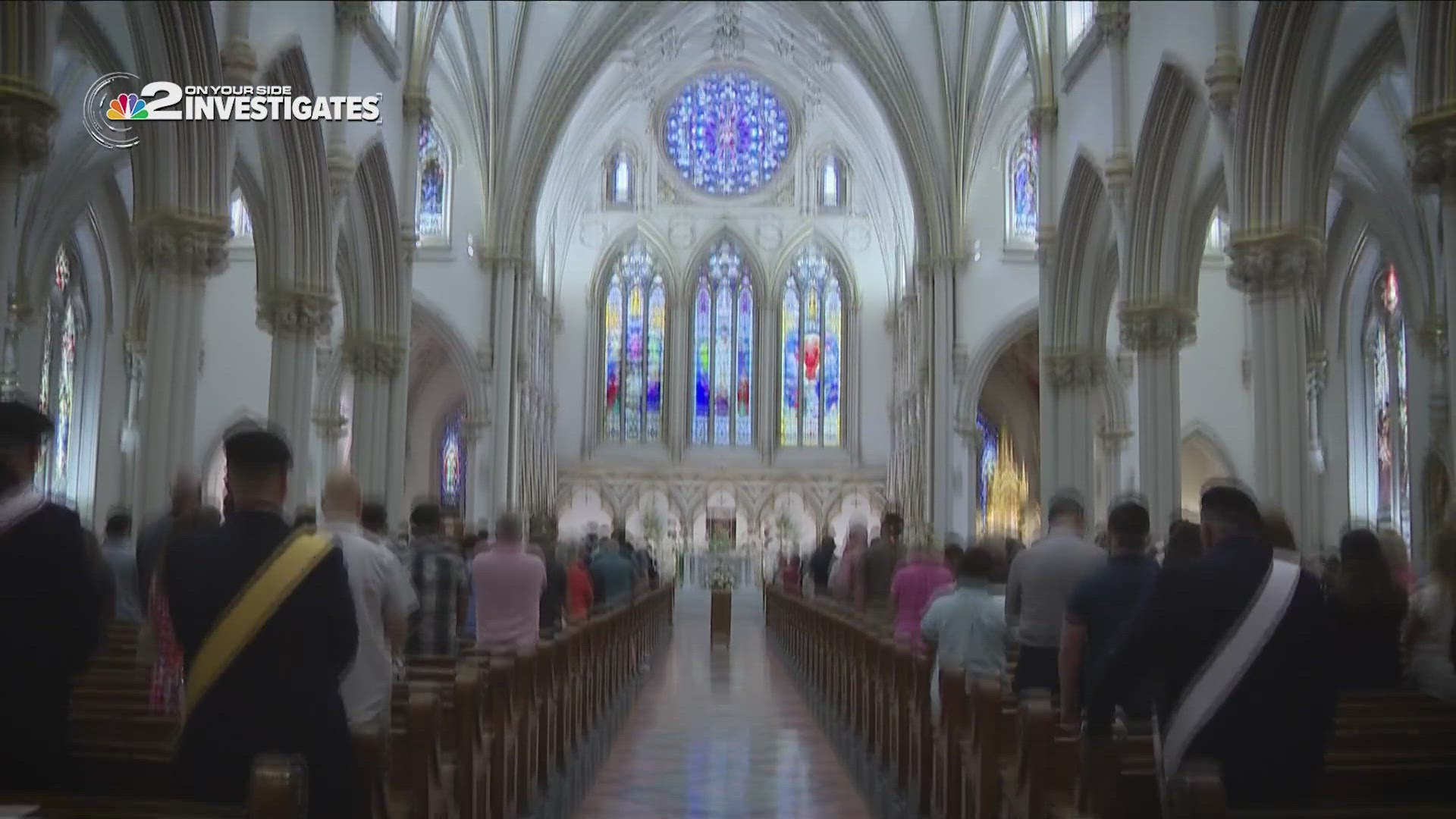BUFFALO, N.Y. — Editor’s note: This is Part 2 of an ongoing 2 On Your Side series, “Faith & Fallout,” which examines multiple issues facing the Diocese of Buffalo, including the sexual abuse of children, bankruptcy, church closings and how the diocese spends donations by parishioners.
The Diocese of Buffalo is in the midst of a bankruptcy process that has dragged on for more than four years, spurred by hundreds of lawsuits alleging the abuse of young children by Buffalo priests.
It is the second-longest bankruptcy ever among Catholic dioceses in the U.S. That slow pace and big spending by church leaders has some asking just how bankrupt the diocese really is.
For this series, 2 On Your Side Investigates gave Bishop Michael W. Fisher multiple opportunities over the course of three weeks to speak about the troubles facing the Catholic Diocese of Buffalo.
Through a spokesperson, Fisher declined the interview requests and directed 2 On Your Side to speak with Richard Suchan, the diocese’s chief operating officer.
Investigative Reporter Charlie Specht asked, “The hierarchy of the church is such that the bishop is at the top. Why are we here talking to you and not to Bishop Fisher?”
Suchan responded, “Bishop Fisher is currently on vacation. He is in Buffalo, but he is on vacation this week.”
By the second question of the interview, it became clear that Suchan was not prepared to answer all of our questions.
“The diocese is asking Catholics in every parish to sacrifice their hard earned money because bishops like Bishop Malone and others lied to them and tried to cover up sexual abuse,” Specht said. “How do you explain that to Catholics?”
Suchan stated, “Actually I was not prepared for this. This was not what I thought we were going to be talking about.”
It wasn’t the only time during the interview that Suchan drew a blank.
“Why does a religion need a criminal defense attorney on retainer?” Specht asked.
“I can't answer that question now,” Suchan said. “I'm not prepared to.”
2 On Your Side sifted through hundreds of monthly spending reports the diocese is required to submit to U.S. Bankruptcy Court.
Those reports show the diocese has spent hundreds of thousands of dollars on salaries for top executives, including:
- $167,000 for Suchan, the diocese’s COO.
- $140,000 for Albert Gress, the diocese’s chief financial officer.
- $130,000 for Melissa Potzler, the diocese’s chancellor and child protection policy coordinator.
Parishioners like Fran Zulawski-Krajewski of West Seneca are skeptical of such spending.
“It's not justified at all,” Zulawski-Krajewski said.
Zulawski-Krajewski said the people running the diocese should make the same sacrifices as people in the pews.
“Obviously, they didn’t cut salaries,” she said. “They didn’t eliminate these pricey jobs.”
Suchan said it is fair to ask what sacrifices members of the church hierarchy are making during the bankruptcy process.
“For decades, the diocese — not only here in Buffalo, but across the country — really had relied on religious, either ordained priests or women religious, to fill most of the senior positions within the chancery,” Suchan said. “There has been an evolution over the past probably 10 years, where more of those positions have been filled with experienced lay professionals.”
Because they have families to support, Suchan said the executives draw higher salaries than priests or nuns, who according to Catholic law cannot get married or have children.
Bankruptcy records show the diocese has spent more than $15 million on fees for attorneys. The diocese said 17% of those fees are for attorneys for survivors, some of whom the diocese is required to pay.
The diocese also spent more than $400,000 on a boutique crisis public relations firm — The Tucker Group of Maryland — even though the diocese has its own in-house spokesperson in Joe Martone.
The diocese also paid $236,000 during bankruptcy to James Beardi, a retired M&T Bank executive who chairs the diocesan finance council, for “consulting fees.”
Kevin Koscielniak, an abuse survivor who sued the diocese in state court, said he wonders how a bankrupt organization is able to afford $15 million in professional fees.
“If you were really bankrupt, you can’t afford to pay those attorney’s fees,” Koscielniak said. “You could have paid off those liabilities. Evidently, you had $15 million because you already spent it. You could have paid off those liabilities, meaning that you’re not bankrupt.”
Chief Bankruptcy Judge Carl L. Bucki has wondered, too. According to court transcripts, Bucki said in two hearings, “Where is the money coming from for these legal fees?”
At another hearing, Bucki said, “That’s a lot of money … that could go to victims.”
Suchan said the diocese “is technically not bankrupt. The diocese is in the process of a reorganization, which is known as a Chapter 11. We are working on streamlining our operations, streamlining how we conduct our ministry and business functions associated with the diocese, and that has required significant expertise that did not exist within the confines of the chancery itself.”
Part 3 of this series, which will focus on a recent audit and whether the diocese has changed the way it handles sexual abuse, will air on 2 On Your Side at 6 p.m. on Aug. 11.
Have a tip for the 2 On Your Side Investigates team? Contact Charlie Specht at Charlie.Specht@wgrz.com or Sean Mickey at Sean.Mickey@wgrz.com. All tips will be treated as confidential.

